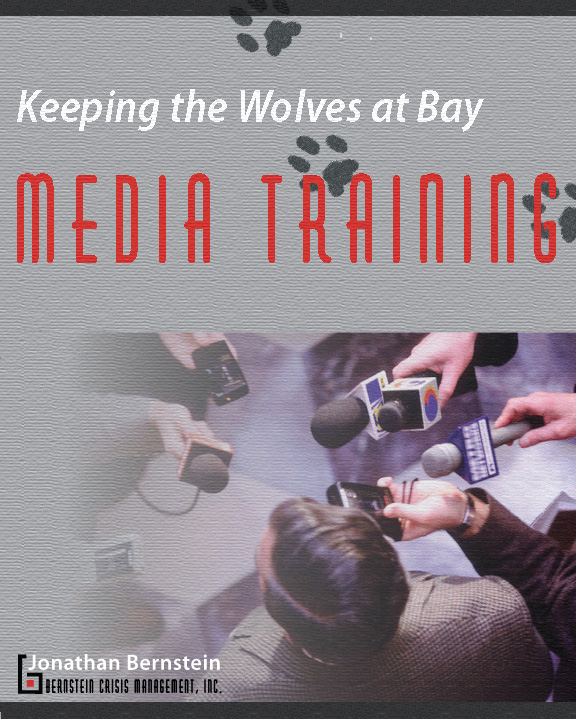JUST A THOUGHT
Deciding not to engage in crisis preparedness activities -- vulnerability assessment, planning, training and simulations -- is exactly the same thing as deciding to incur preventable crises and to suffer far more damage from crises that couldn't be prevented. To think otherwise is delusional.
|
|
|
FROM THE EDITOR
Comedian Robin Williams calls Cricket "baseball on valium."
I was a British schoolboy from ages 8-13, and so I experienced the sport first-hand. It is more interesting from inside the game, but the temptation to go to sleep while not at bat was a constant threat to this young man.
That said, we must credit cricket with two phrases directly related to crisis management:
"That's a bit of a sticky wicket"
and
"That's not cricket!"
OK, I admit it, that second one is a stretch. I'm merely trying to set you up for our first article, in which my British colleague Jonathan Hemus brings us a "right way" crisis management case study involving the world of Cricket.
Subsequently, Jeff Chatterton returns to the pages of Crisis Manager with his explanation of how to look at, and deal with, hostile audiences during a crisis.
Changing subjects with no segue....
The Bernstein Crisis Management website has recently been redesigned, and I invite you to visit the site and let me know what you think of it. The former functionality has been retained, but the "look" of the site, which was previously built up in piecemeal over a 10-year period, has been better blended. My thanks to Tao Consultants for their work on the site, ably assisted by my Creative Director, Celeste Mendelsohn, and webmaster Oliver del Signore.
Want to learn more about crisis management? Please check out the Bernstein Crisis Management blog I manage with my son Erik, as well as the Crisis Management blog I host over at Carter McNamara's Free Management Library, where you'll also find a dozen or more other excellent blogs. I confess to having been derelict in my duty at the latter blog due to the press of business, but I'm hoping to make that up very soon, to include posting video commentary.
As always, if you like what you see, please share it with others by using the "Forward Email" link at the bottom of the ezine and tell them to subscribe! IMPORTANT NOTE: If you just "Forward" using your own email program's "Forward" function and your recipient thinks they're being spammed, they can click on the Opt Out link and opt YOU off the list. So use the "Forward Email" link, please.

My best to all, Jonathan
|
CRICKET PASSES THE
ISSUES MANAGEMENT TEST
By Jonathan Hemus
|
Lord Condon, chairman of the International Cricket Council's anti-corruption unit, has just passed responsibility for leadership of the Unit to Sir Ronnie Flanagan. Hearing this news reminded me of the days when I worked with Lord Condon and otherJonathan Hemus
 | executives of the ICC as it first grappled with match-fixing almost ten years ago.
A sport which had fair play at its very core had to fight to protect its reputation in the face of hugely damaging allegations. Since then, similar allegations have surfaced in horse racing, tennis, football and, most recently, snooker.
Before match-fixing erupted in Cricket, it's fair to say that the ICC's approach to reputation management fell short of best practice. But with its subsequent deeds and words, it successfully managed the crisis on its doorstep. In doing so, it fulfilled some of the key criteria of issues management:
- Acknowledge that there is a problem. An ostrich approach is the worst possible response to an issue: recognising the match-fixing problem allowed it to be dealt with, and at the same time preserved the ICC's credibility.
- Engage trusted third parties. The appointment of Lord Condon and the creation of the anti-corruption unit was an inspired move by the ICC: the arrival of an impartial and respected third party to investigate the allegations was much more powerful than any internal enquiry by the ICC. His independent and expert view meant that his words carried greater weight.
- Take action. Lord Condon was given the remit to seek out corruption wherever it existed and implement whatever steps might be necessary to minimise it. The subsequent introduction of a programme of education and enforcement demonstrated that the ICC was serious in its intent to manage this issue.
- Communicate more, not less. Historically, the ICC had maintained an arm's length relationship with the media, communicating as little as possible. As a consequence, it lacked strong relationships with journalists, failed to communicate its messages effectively and was seen by some as aloof and out of touch. By implementing a new policy of openness, engagement and relationship building, this situation was transformed. Stakeholder research six months into the new pro-active communication strategy revealed a dramatically higher level of understanding, support and respect for the ICC.
I have great respect for the way that cricket got to grips with match-fixing - and I applaud Barry Hearn for the similar way that he responded decisively to allegations against John Higgins. Both episodes reveal an approach to issues management that could be effectively adopted by any organisation finding its reputation under serious threat.
Jonathan Hemus is the founder of Insignia Communications, a consultancy specialising in corporate reputation management and crisis communication. His experience in crisis management for a range of global corporations and public sector organisations has helped to protect and preserve many reputations. Contact: [email protected].
|
SPEAKING THROUGH THE ENEMY
By Jeff Chatterton |
I was at an event yesterday and was asked an interesting question. Paraphrased, it was essentially, "What do you do when your enemies don't like what you have to say?"Jeff Chatterton
 | My answer was brief and immediate. "Welcome it."
Far too often, we get in trouble by attempting to be all things to all people. And the reason we get into trouble is really quite simple - it never works.
A very wise man once gave me his theory of audience diversification. Take any contentious issue, and you can split your universe into five "S's.
- Supporters - Your friends through thick and thin. 2% of the audience.
- Sympathizers. Mostly supportive, but occasionally not impressed by you or your conduct.5 % of the audience.
- Straddlers. Don't know you, don't care about you, don't care about the issue. End of story. A whopping 86% of the audience.
- Skeptics - Don't like you, but will, on rare occasion, back you up. 5% of the audience.
- Splenetics. Dedicated to "venting their spleen on you." No matter what you say or do, they will hate you. Approximately 2% of the audience.
We spend all our time with the two folks at the opposite ends of the spectrum - the supporters, because they're comfortable. And the splenetics, simply because they make the most noise. And why are we wasting our time trying to win over the splenetics? It's because far too often, people confuse volume with importance.
Just because a television camera shows up at your door demanding an answer doesn't mean you have to supply the answer they're looking for. Simply because an angry activist group stages a protest doesn't mean you have to respond to the allegations in a way that satisfies them. Your job is to satisfy the supporters (easy), the sympathizers (still easy), the straddlers (sort of easy, depending on whether they care), and the skeptics (much tougher - but far simpler than talking to a splenetic.)
In other words - respond THROUGH splenetics, don't respond TO splenetics.
Case in point - a man in Britain claims religious discrimination because he is asked to remove his hood. His claim - as a member of the Church of Jedi, he is required to wear a headcovering at all times. You read that correctly - the Church of Jedi. For those who are unfamiliar - Luke Skywalker and Darth Vader of Star Wars fame were both "Jedi Knights."
Most people would assume (correctly, I may add) that becoming a member of the Church of Jedi is roughly equivalent to serving under GI-Joe, or legally changing your name to "Barbie." You can handle this in one of two ways.
- Example one: A job centre issued a public apology to the 'offended individual.' They took a splenetic and tried to give him what he wanted. Regardless, he announced he is still planning on suing them. Total communications victory points? Zero.
- Example two: Tesco Supermarkets spoke THROUGH an offended Jedi and publicly said "Obi-Wan Kenobi, Yoda and Luke Skywalker all appeared hoodless without ever going over to the Dark Side and we are only aware of the Emperor as one who never removed his hood. If Jedi walk around our stores with their hoods on, they'll miss lots of special offers." Total communications victory points? Lots. Plus, come on now - it's funny. You and I are now discussing Tesco. As a complete "straddler" on the Jedi issue, I'm now a Tesco Sympathizer.
A point to remember - ignoring your enemy by speaking through them is NOT the same thing as not responding. One requires a deft touch, a thick skin, and the ability to withstand criticism. But simply ignoring an issue requires a good liability lawyer or a bankruptcy specialist.
Obviously, not responding implies the problem will eventually 'go away.' A media vacuum isn't going to simply 'go away.' After all, your enemy splenetics started this fight - they are more than happy to continue it. Why let them continue to score free points at your expense?
It comes down to this - if people are going to be talking about you, you want them to be doing it on YOUR terms - not theirs. Counter a splenetics point by talking through them. Then hold on and get ready for the hair pulling and gnashing of teeth that will inevitably follow.
Jeff Chatterton is a friend and colleague with a unique reputation management practice in Ontario, Canada. More info at http://checkmatepublicaffairs.com.
|
BUSINESS ANNOUNCEMENTS
(aka blatant self-promotion)
Keeping the Wolves at Bay: Media Training
What has 80+ pages of hard-hitting, entertaining and easy-to-read guidance on how to deal with both traditional and online media during times of crisis? The answer is
Keeping the Wolves at Bay - Media Training. The, four-color, perfect-bound, 8x10 manual is currently available both in hardcopy ($25) and PDF form ($10). Volume discounts are available; write to Jonathan Bernstein for that information.
Here's a couple of teaser reviews for you:
Jonathan Bernstein's Keeping the Wolves at Bay is an eminently practical guidance for anyone - business leader, celebrity, politician - who must willingly or unwillingly face the glare of media attention. It appears
at a moment in time when the social media and other digital communications have upped the ante exponentially.
Bernstein's practicum on media relations takes on renewed urgency as news, gossip, and opinion now drive
public perception virally and at the speed of light.
Richard Levick, Esq.
President & CEO
Levick Strategic Communications, LLC
Even if you think
you'll never, ever be interviewed by the media, buy this book and read it cover
to cover. It isn't a substitute for media training. But it will give you the
tools and confidence to go head to head -- and possibly even defang -- rabid reporters,
blood-thirsty bloggers and social networking buffoons who are out to besmirch
your good name. Joan Stewart, The Publicity Hound
The book and other products can be found at the
Crisis Manager Bookstore
Want To Blog
And Tweet About
Your Organization But Don't Have Time?
Missing out on all the promotional and SEO
advantages of doing so? Hire someone to be your voice...like Erik Bernstein,
aka "Son of Crisis Manager."
More info:[email protected].
|
GUEST AUTHORS
GUEST AUTHORS are very welcome
to submit material for "Crisis Manager." There is no fee paid, but most
guest authors have reported receiving business inquiries as a result of
appearing in this publication. Case histories, experience-based
lessons, commentary on current news events and editorial opinion are
all eligible for consideration. Submission is not a guarantee of
acceptance.
|
ABOUT THE EDITOR & PUBLISHER
Jonat han Bernstein is president of Bernstein Crisis Management, Inc., a national crisis management public relations agency providing 24/7
access to crisis response professionals. The agency engages in the full
spectrum of crisis management services: crisis prevention, response,
planning & training. He has been in the public relations field
since 1982, following five-year stints in both military intelligence
and investigative reporting. Write to [email protected]. han Bernstein is president of Bernstein Crisis Management, Inc., a national crisis management public relations agency providing 24/7
access to crisis response professionals. The agency engages in the full
spectrum of crisis management services: crisis prevention, response,
planning & training. He has been in the public relations field
since 1982, following five-year stints in both military intelligence
and investigative reporting. Write to [email protected].
|
|
LEGAL
DISCLAIMER
All
information contained herein is obtained by Jonathan Bernstein from sources
believed by Jonathan Bernstein to be accurate and reliable.
Because of
the possibility of human and mechanical error as well as other factors, neither
Jonathan Bernstein nor Bernstein Crisis Management is responsible for any
errors or omissions. All information is provided "as is" without
warranty of any kind. Bernstein Crisis Management and Jonathan Bernstein make
no representations and disclaim all express, implied, and statutory warranties
of any kind to the user and/or any third party including, without limitation,
warranties as to accuracy, timeliness, completeness, merchantability, or
fitness for any particular purpose.
Unless due
to willful tortuous misconduct or gross negligence, Jonathan Bernstein and
Bernstein Crisis Management shall have no liability in tort, contract, or
otherwise (and as permitted by law, product liability), to the user and/or any
third party.
Under no
circumstance shall Bernstein Crisis Management or Jonathan Bernstein be liable
to the user and/or any third party for any lost profits or lost opportunity,
indirect, special, consequential, incidental, or punitive damages whatsoever,
even if Bernstein Crisis Management or Jonathan Bernstein has been advised of
the possibility of such damages.
A service
of this newsletter is to provide news summaries and/or snippets to readers. In
such instances articles and/or snippets will be reprinted as they are received
from the originating party or as they are displayed on the originating website
or in the original article. As we do not write the news, we merely point
readers to it, under no circumstance shall Bernstein Crisis Management or
Jonathan Bernstein be liable to the user and/or any third party for any lost
profits or lost opportunity, indirect, special, consequential, incidental, or
punitive damages whatsoever due to the distribution of said news articles or
snippets that lead readers to a full article on a news service's website, even
if Bernstein Crisis Management or Jonathan Bernstein has been advised of the
possibility of such damages. Authors of the original news story and their
publications shall be exclusively held liable. Any corrections to news stories
are not mandatory and shall be printed at the discretion of the list moderator
after evaluation on a case-by-case basis.
|
|
|
|